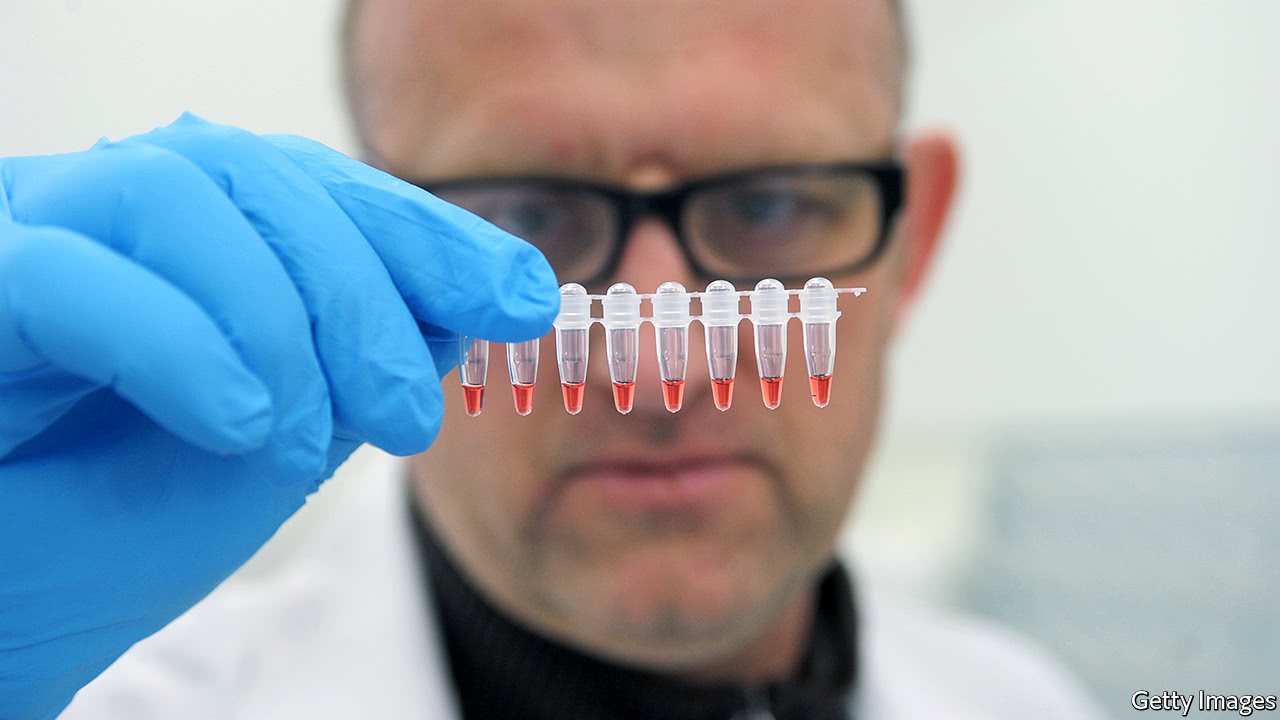Insurers worry about adverse selection; the insured worry about discrimination

IF A genetic test could tell whether you are at increased risk of getting cancer or Alzheimer’s, would you take it? As such tests become more accessible, more and more people are saying “yes”. The insurance industry faces a few headaches as a result.
Once used only for medical reasons, basic predictive genetic tests can now be ordered online for a few hundred dollars. One company, 23andMe, in California, has collected some 4,000 litres of sputum since 2007, enlightening 2m people on their ancestry, health risks and what they may pass on to offspring. In April it received regulatory approval to screen for risk factors connected to ten diseases and genetic conditions, including late-onset Alzheimer’s and Parkinson’s. The ruling could open the floodgates for others to sell direct to consumers.
“Information is power”, argue many who take such tests. But insurers fear that without equal access to such information, they will lose out to savvy customers. Consumer groups, on the other hand, fear that if underwriters did have access to such information, people with “bad” genes might find themselves unfairly excluded from cover. Either way, the scientific advances could well disrupt insurance significantly.
Unlike diagnostic genetic tests, predictive ones are conducted on people without symptoms. The best-known example was provided by Angelina Jolie, an actress who discovered she had a gene mutation that markedly raised her risk of breast cancer. She underwent a double mastectomy.
Tests might influence financial as well as medical decisions. A person at increased risk of dying young may want to buy life insurance. Someone likely to contract cancer may buy cancer or critical-illness cover, which pays a lump sum upon diagnosis. Because predictive tests—unlike diagnostic ones—often need not be disclosed, the customer can secure an advantage over a future insurer.
So underwriters warn that predictive genetic testing could well lead to adverse selection. The New York Times recently reported on a woman who bought long-term care insurance after testing positive for ApoE4, a mutation of a gene related to increased risk of Alzheimer’s. The insurer had tested her memory three times before issuing the policy, but could not know about the genetic result. Robert Green, at Harvard University, found that people told they have the mutation were five times more likely to buy long-term care insurance than those without such information.
Asymmetry of information—when the customer knows more than the insurer—is the industry’s nightmare. If predictive tests further improve and become more common while non-disclosure rules stay in place, some insurance products might eventually die out. Either insurers would go belly-up, or premiums would become prohibitively expensive. Hence, argue some insurers, if the customer knows something relevant about their health, so should the insurer.
But tests might also help insurers. Christoph Nabholz, from Swiss Re, a reinsurance giant, is most excited about tests that spot early signs of cancer or cardiovascular disease. For life and health insurers, who want to keep people alive and well, such information could be invaluable. Discovery, a South African health insurer, plans to offer customers a test that maps part of their genome. The focus is on “actionable data”, where medical intervention or lifestyle change could mitigate risk, explains Jonathan Broomberg from Discovery.
This might help people who are already insured. But it worries those seeking new policies, who fear that underwriters may use predictive information to discriminate. Some might lose access to insurance. This raises ethical questions about when, if ever, genetic discrimination is acceptable. Moreover, since the relative role that genes play in the development of diseases is still being studied, some people might be unfairly and wrongly penalised.
Unpredictability rules
So regulations today often protect consumers from the mandatory disclosure of predictive tests. But the rules are patchy. In Britain the industry has agreed to a blanket moratorium, renewable every three years, on using predictive genetic information. The sole exception is Huntington’s chorea, where a test of one gene is infallible and has to be disclosed to an insurer for life cover worth more than £500,000 ($662,000). In America the Genetic Information Nondiscrimination Act bans health insurers (and employers) from using such results, but is silent on other types of insurance. In several countries life insurers may already ask for disclosure of predictive genetic tests for policies over a certain value.
But testing is rarely cut-and-dried. Ronnie Klein from the Geneva Association, an insurance-industry think-tank, says that, unlike Huntington’s, most illnesses stem from a number of factors, including lifestyle and environment, and a combination of genes. For example, although the ApoE4 allele increases the risk of Alzheimer’s, many without it still get the disease.
Some regulators, such as Germany’s, have outlawed direct-to-consumer tests. But nothing stops Germans from ordering from abroad, and, just as it became normal for life insurers to ask for family history, so insurers will surely eventually have access to relevant genetic information. The question will be what they are allowed to do with it. When blood tests for AIDS first appeared, insurers also fretted about adverse selection. Many jurisdictions ruled they could not be used for calculating health premiums, as these were a basic good, but could be used for life policies. As genetic testing spreads, society and insurers may face many similar difficult assessments.
No comments:
Post a Comment
Note: Only a member of this blog may post a comment.